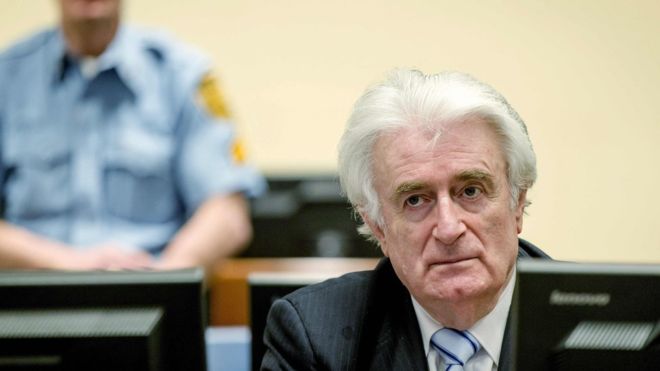This Serbian war criminal is the latest in a long line of psychiatrists who have traduced their roles as doctors in the service of the state
Dr Radovan Karadzic has learned his fate. Indicted before the International Court of Justice for crimes against humanity and genocide in the Bosnian war of the early 1990s, offences rated as the worst in Europe since 1945, make him the first doctor charged since the Nuremberg Medical Trial.
Found guilty on 10 out of 11 charges, he has lost his appeal and been sentenced to life imprisonment.
Karadzic and his ruthless military leader, General Ratko Mladic, served as proxies for Slobodan Milosevic’s plan to create a Greater Serbia. His crimes include the indiscriminate murder of civilians, the shelling of the Markale marketplace, the use of 248 United Nations peacekeepers as human shields and the murder of up to 7500 people at the “safe haven” of Srebrenica.
A feature of the insurrection was the use of terror tactics, including mass rape, to clear areas of non-Serbian inhabitants, known by the appalling soubriquet of ethnic cleansing.
Up to the time he established the Republika Srpska in 1992, Karadzic was a practising psychiatrist at the Kosovo Hospital in Sarajevo. He repaid his colleagues by shelling the hospital, killing staff and patients.
Early indications of his defective moral compass were examples of his selling medical certificates for social security and pensions, as well as fraudulent use of state funds that led to 11 months in jail.
The surprising thing is that he remained apolitical until 1989, mixing easily with others in multi-ethnic Sarajevo. This is consistent with his opportunistic nature; when a political vacuum arose, he exploited it ruthlessly.
Karadzic remained unrepentant about his role in the war, demonstrating an outlandish capacity for falsification of reality and blaming everything on Bosnian persecution of Serbians.
After the 1995 Dayton Accords, Karadzic went underground with support from the government and military. His arrest in Belgrade in July 2008 proved, if nothing else, that the Balkan tradition of extremism, grandiosity and absurd gestures still thrived.
Working as an alternative practitioner under the teasingly alliterative title of Dr Dragan David Dabiç, Karadzic promoted a weird theory of bioenergetics.
His familiar jut-jawed face obscured by a dense beard and his hair bound in a ponytail, he looked like nothing less than an ageing hippy selling dope paraphernalia at a market stall. Showing that old habits die hard, he had a close association with an attractive divorcée who coyly denied any involvement and promptly became a media celebrity.
While many aspects of Karadzic’s personality remain deeply enigmatic, he displayed an extraordinary degree of reckless opportunism in which the instincts of an extreme gambler were unchallenged by any restraint or fear of the consequences.
His most enduring characteristics are his grandiose self-image, reckless and profligate nature, boundless opportunism and grotesque capacity for self-deception. If nothing else, they disqualify him as a candidate for Hannah Arendt’s “banality of evil”.
Does it matter that Karadzic was a psychiatrist in addition to being a ruthless xenophobic nationalist?
The answer is yes; Karadzic is just the latest in a line of psychiatrists who have traduced their roles as doctors in the service of the state.
He used his Tavistock training in group therapy to manipulate his political opponents as well as organise terror tactics. In 1993, the American Psychiatric Association passed a motion condemning Karadzic for ‘”rutal and inhumane actions … because, by membership and training, Dr Karadzic claims membership in our profession”.
Karadzic’s sentence is justice in the strictly legal sense, but it will be little consolation to the survivors, families and relatives of the worst atrocities in Europe since the SecondWorld War.
Karadzic, we can be sure, will continue to see himself as a grand martyr for the Serbian people and, as recent events in Bosnia indicate, have no shortage of supporters. He thus joins the depressingly long list of genocidal leaders in the last century.
The role of psychiatrists in the perpetration of atrocity is less of a coincidence that it may appear. They paved the way for the Jewish Holocaust by gassing their patients on the grounds of “life unworthy of life”.
Since the Second World War, participation of psychiatrists (and psychologists) in state abuse has been something of a growth industry. They played a role in abuse of dissidents in communist Europe, China and Cuba. There are disturbing reports about psychologists supervising torture of suspects at the US-run Guantanamo Bay prison.
The concept of total warfare means dehumanising the enemy with strategies involving psychological warfare, propaganda, torture and mass terror targeting the civilian population. The role of psychiatrists in the Bosnian War is not as much an exception, but a warning of what lies ahead.
Medicine, an insightful observer said, bears within it the seeds of its own downfall. Where human rights and genocide are concerned, this applies as much to psychiatry as it does to the rest of the profession.
We cannot carry on assuming that the past will not be repeated. Karadzic has largely been ignored in the discourses of the profession.
By understanding his role as a genocidaire we can prepare the next generation for the hazards that lie ahead.
Robert M Kaplan is a forensic psychiatrist at Graduate School of Medicine, University of Wollongong. His book, The King Who Strangled His Psychiatrist and Other Dark Tales, is in press


